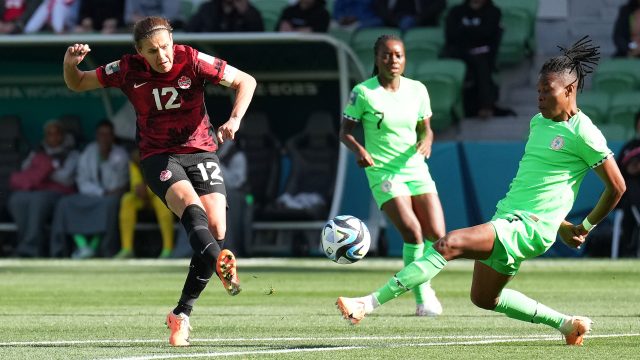
A common complaint amongst the Canadian women’s team going into this summer’s FIFA Women’s World Cup is that it felt disrespected by not being considered among the tournament favourites.
But respect is earned, it’s not automatically given. In the Canadians’ case, opponents don’t fear them anymore (if they ever truly did), nor does their gold-medal run at the Tokyo Olympics count for much these days. It’s ancient history. The reigning Olympic champions were reminded of these hard truths in a 0-0 draw against Nigeria on Friday at Melbourne Rectangular Stadium in its opening match of the World Cup.
Action in Group B kicked off on Thursday when co-host Australia earned a 1-0 win over the Republic of Ireland. Australia tops Group B with three points, ahead of Canada and Nigeria (one point apiece) and Ireland (zero points). The two best teams move on to the knockout round. Friday’s stalemate leaves Canada with some work to do in its next two matches, especially if it has any chance of finishing in the top two.
Here are the three major takeaways from Canada’s draw against Nigeria.
Canada’s attack leaves a lot to be desired
Canada’s scoring prowess was a cause for concern coming into this World Cup, as it had been shut out three times through its first five matches of 2023 with just three goals to its credit. There’s plenty of star power amongst Canada’s crop of forwards, but there were a lot of questions about them ahead of the World Cup.
Christine Sinclair isn’t the same goal-scoring threat that she used to be. Deanne Rose and Nichelle Prince are both coming off lengthy injury layoffs. Jordyn Huitema had just one goal in her previous 13 appearances for Canada ahead of the World Cup. Adriana Leon had what can charitably be described as an unsuccessful club season at Manchester United.
Friday’s limp effort by the Olympic champions isn’t going to silence pundits and critics who rightfully asked where the goals would come from at this tournament.
Canada lacked a cutting edge up front, and couldn’t find their attacking rhythm. Instead of playing its usual pressing game, Nigeria was content to sit back in a deep defensive block that frustrated Sinclair and her cohorts, which it did to great effect. The Olympic champs only registered three shots on target, despite enjoying the lion’s share of possession and carrying the bulk of the play over 90 minutes. Nigerian goalkeeper Chiamaka Nnadozie was barely tested and only had to make two saves from open play, neither of which were particularly troublesome.
This is the first time Canada has failed to score in its opening match at the World Cup. Based on the quality of their attacking display against Nigeria, it’s difficult to envision the floodgates opening up for the Olympic champions.
Jessie Fleming’s absence sorely felt by Canada
There was a bit of scare in the Canadian camp earlier this week when influential midfielder Jessie Fleming sat out a pair of practices with a lower-body injury before taking part in the team’s final training session. She ended up sitting on the bench and didn’t see any action against Nigeria, as Canada wanted to ensure she didn’t aggravate the injury so she could play later in the tournament.
Fleming, from London, Ont., has 19 goals and six assists in 115 caps (101 starts) for Canada and has appeared in two previous World Cups. The Chelsea midfielder was a key figure in the Canadian team’s gold-medal run at the Tokyo Olympics, scoring against the United States and Sweden in the semifinals and final. She’s also been touted as Canada’s next captain whenever Christine Sinclair decides to retire.
Canada could have badly used her against Nigeria. Without Fleming in the lineup, the Canadians looked out of sync in midfield with the duo of Julia Grosso and Quinn unable to effectively combine with one another. Canada lacked a cutting edge in attack, and couldn’t find their attacking rhythm in the centre of the park without Fleming pulling the creative strings. Canada enjoyed 68 per cent possession in the first half without registering a single shot on target, a sign of just how impotent it was in its buildup play.
Fleming has become Canada’s de facto on-field leader the past few years thanks to the way she orchestrates things in the middle of the park, her tireless running and ability to set up her teammates with goal-scoring chances with her sublime distribution skills.
Instead of playing its usual pressing game and engaging the Olympic champs high up the field, the Africans were content to sit back in a deep defensive block that frustrated Canada over the course of the 90 minutes. From a Canadian perspective, the game was calling out for someone of Fleming’s quality and game-breaking ability.
Christine Sinclair’s penalty miss a big psychological blow
After producing very little in the way of dangerous moments in the first half, Canada was given a lifeline shortly after the halftime break.
Nigerian forward Francisca Ordega clumsily stamped on Christine Sinclair’s foot while attempting a challenge for the ball inside the box after the Canadian captain took a pass from substitute Cloé Lacasse. Ordega originally escaped punishment before Canada ended up being awarded a penalty after a VAR review.
Sinclair stepped up to the spot with the game resting on her broad shoulders, only to see Nigerian goalkeeper Chiamaka Nnadozie make a brilliant one-handed, diving save to deny the Canadian captain. Sinclair couldn’t get to the rebound fast enough and had a look of utter frustration etched on her face after the scoring chance went begging.
Had Sinclair converted that penalty, she would have set a record as the first player, male or female, to score in six different World Cup tournaments.
With Jessie Fleming on the bench, the responsibility of taking the penalty fell to the 40-year-old Sinclair, who has a world-record 190 international goals to her credit – 10 of which have come at the Word Cup.
But Sinclair’s failed penalty attempt seemed to completely knock the life out of an already listless Canadian side. Canada’s captain was subbed out later in the half, while fellow forwards Cloe Lacasse, Evelyne Viens and Nichelle Prince all came off the bench. Only Viens came close to scoring – her one-time shot from in close off a setup from Jordyn Huitema produced another smart save by Nnadozie.
Coach Bev Priestman brought other substitutes and tried moving players around after Sinclair left the game, but nothing worked as Nigeria held strong and comfortably thwarted the Canadians’ attacking advances.
What’s next for Canada
The Canadians will meet the Republic of Ireland at the Perth Rectangular Stadium on July 26.
John Molinaro is one of the leading soccer journalists in Canada, having covered the game for over 20 years for several media outlets, including Sportsnet, CBC Sports and Sun Media. He is currently the editor-in-chief of TFC Republic, a website dedicated to in-depth coverage of Toronto FC and Canadian soccer. TFC Republic can be found here.








